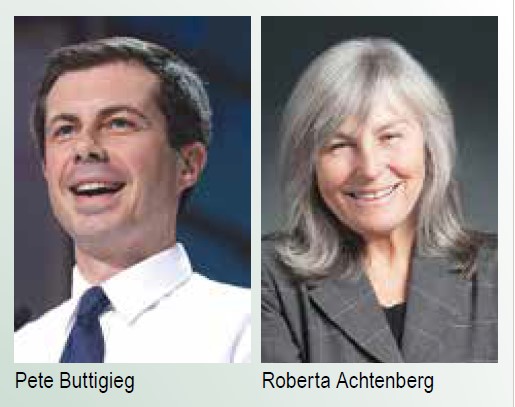
By Stuart Gaffney and John Lewis–
When Pete Buttigieg won Senate confirmation last week becoming the first openly gay member of the Cabinet, our thoughts immediately turned to the first openly LGBTIQ person ever to receive Senate confirmation: San Francisco’s own Roberta Achtenberg.
In 1993, Achtenberg was nominated by President Bill Clinton and confirmed by the Senate to be the Assistant Secretary for the Office of Fair Housing and Equal Opportunity. However, unlike today, it was a bruising battle back then. The Christian Right launched a virulently homophobic campaign to fight Achtenberg’s nomination. The notorious former North Carolina Senator Jesse Helms, famously denounced Achtenberg as a “damn lesbian.”
Achtenberg and many others would later claim the title “damned lesbian” as a badge of honor. But Linda Rapp in the glbtq Encyclopedia recalls a “long and grueling” confirmation process in which several conservative Senators attempted to block her nomination. Helms also attacked Achtenberg as an “intolerant radical.” At the time of her nomination, Achtenberg had been an LGBTIQ rights activist for years. She was one of the co-founders of the Lesbian Rights Project (later renamed the National Center for Lesbian Rights), and she and Carole Migden in 1989 became the first lesbians elected to the San Francisco Board of Supervisors.
Achtenberg and her then-partner Judge Mary Morgan were one of the most visible lesbian couples to have a child at a time when such role models were rare, and their family was an inspiration to many. But Helms accused Achtenberg of launching an “insane assault on family values.” He also decried her as a “mean person” who “tried to bully the Boy Scouts.” Achtenberg as a board member of the San Francisco United Way had voted along with all of her over 50 colleagues to deny funding to the Boy Scouts because of their anti-gay policies. Achtenberg ultimately won Senate confirmation by a 58–31 margin.

By contrast, 28 years later Pete Buttigieg won Senate confirmation by a 86–13 vote without even a whisp of anti-gay rhetoric from opponents. The primary stated reasons the 13 Republican Senators voted against Buttigieg were his opposition to the Keystone Pipeline and his support for Green New Deal policies. Far from opposing Buttigieg, one of his home state senators, Indiana Republican Todd Young, declared he had “a great deal of respect” for Buttigieg and that “it will be good to have a Hoosier” as Transportation Secretary.
After Buttigieg’s committee hearing, Democratic Senator John Testor of Montana lauded him for having “put on a clinic for how a nominee should … act.” Part of Buttigieg’s presentation included introducing his husband Chasten to the committee and having him at this side throughout.
The road to LGBTIQ people being able to win Senate confirmation based on their qualifications has not been easy, and the struggle continues. Four years after Achtenberg’s confirmation, the Christian Right successfully blocked gay philanthropist and activist James Hormel’s nomination to become the first openly gay ambassador—even to the tiny country of Luxembourg. Clinton was only able to appoint Hormel as acting ambassador through a recess appointment that required no Senate approval.
Now, a number of openly queer people have won Senate confirmation as important government officials, federal judges, and ambassadors, but adequate representation is still lacking. No openly gay person has ever been nominated for the U.S. Supreme Court, and only two LGBTIQ people have served in the U.S. Senate itself. We are excited about President Biden’s diverse LGBTIQ appointees, in particular Dr. Rachel Levine as Assistant Secretary of Health, who if confirmed will become the first openly transgender person to win Senate approval.
Vice President Harris acknowledged in her victory speech last November that she stood “on the shoulders” of countless women who had fought for equality. So too does Secretary Buttigieg stand on the shoulders of Achtenberg and myriad other LGBTIQ activists who have stood fearlessly for our right to be ourselves and be equal. Indeed, Buttigieg was just eleven years old when Achtenberg prevailed in her confirmation battle.
When Achtenberg was confirmed years ago, we felt that “we” as a movement had risen to a new level of acceptance and access to power. We remember how, shortly after the 1992 election, Achtenberg convened a community meeting where she articulated hope for the future for us as a movement like never before. Unlike Achtenberg, Buttigieg did not cut his teeth as an LGBTIQ activist. But when we hear Buttigieg speak authentically about his experience as a gay person, advocate for full equality, and kiss his husband Chasten on the presidential primary debate stage, we feel the sense of “we” as well.
We take inspiration from LGBTIQ people in public office or otherwise in the public arena who are not just in it for themselves but consider themselves participants in a broad civil rights movement for freedom, dignity, and equality. We embrace a movement where we not only stand upon the shoulders of others who worked so hard to make our dreams possible, but also we move forward shoulder to shoulder together. Our individual victories become collective victories. “We” win, and we can all proudly claim the moniker “damned lesbian” in our own way.
Stuart Gaffney and John Lewis, together for over three decades, were plaintiffs in the California case for equal marriage rights decided by the California Supreme Court in 2008. Their leadership in the grassroots organization Marriage Equality USA contributed in 2015 to making same-sex marriage legal nationwide.
Published on February 11, 2021
Recent Comments